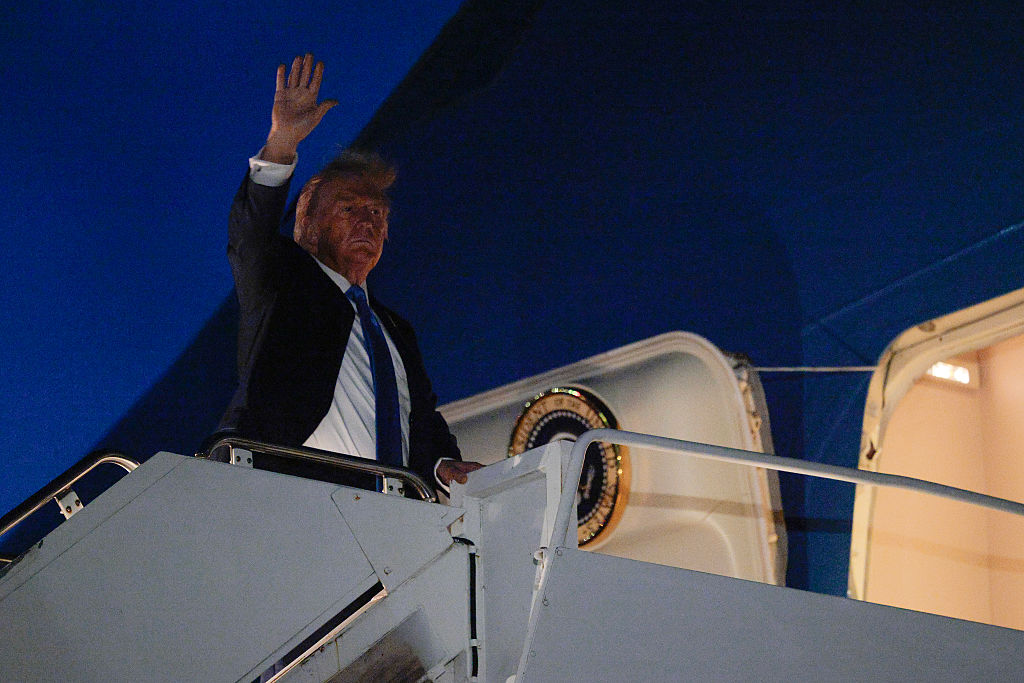US airstrikes did not destroy Iran’s nuclear capability and only set it back by a few months, according to one initial US intelligence assessment.
The statement on June 24 came as a shaky ceasefire brokered by US President Donald Trump took hold between Iran and Israel.
Earlier, as Trump prepared to fly to The Hague for a NATO summit, he had fumed that both counties “don’t know what the f*** they’re doing”.
The furious President told reporters: “We have to have Israel to calm down because they went on a mission this morning. I’ve got to get Israel to calm down,” AFP said.
Later, on board Air Force One en route to the NATO Summit, he insisted that Iran “isn’t going to have a nuclear weapon”, claiming it was “the last thing’ on the country’s mind”, according to UK news outlet The Daily Mirror.
Ahead of the summit in The Hague, NATO chief and former Dutch prime minister Mark Rutte has aimed to keep Trump happy with a carefully crafted deal that met his demand for NATO allies to spend 5 per cent of GDP on defence.

“He’s been quite masterful in keeping the alliance together in a very difficult and sensitive period,” a senior NATO diplomat told AFP, speaking on condition of anonymity.
Rutte’s tour de force was cooking up a compromise on spending that allowed Trump to claim victory by hitting his headline 5 per cent figure, while in reality setting the bar lower, the diplomat said.
The agreement saw countries promise to spend 3.5 per cent of GDP on core military spending, while the other 1.5 per cent would go to a looser array of areas like infrastructure and cybersecurity.
Shortly before Trump set off for the NATO summit, Rutte had issued a message to him, saying that getting the deal was “something NO American president in decades could get done”.
“Europe is going to pay in a BIG way, as they should and it will be your win,” said Rutte.
Trump clearly liked the message as he posted it on his Truth Social feed.
Regarding the June 21 US bunker-bombing raid in Iran, the preliminary assessment by the US Defence Intelligence Agency (DIA) was disclosed to Reuters by three sources familiar with the matter.
One of the sources alleged that Iran’s enriched uranium stocks had not been eliminated and in fact the country’s nuclear programme may have been set back only a month or two.
The New York Times (NYT) said on June 24 that the strikes sealed off the entrances to two of the facilities but did not collapse their underground buildings, according to US officials.
That contradicted Trump’s assertion that the strikes had succeeded in destroying Tehran’s nuclear programme – and raised questions among experts about further US military action if indeed the programme survived the intense aerial bombardment.
Some Israeli officials said on June 24 they also believed that the Iranian Government had maintained small covert enrichment facilities so it could continue its nuclear programme in the event of an attack on the larger facilities, according to NYT.
Other officials noted that the DIA report found that the three nuclear sites — Fordo, Natanz and Isfahan — had suffered moderate to severe damage, with the facility at Natanz damaged the most. It was not clear whether the Iranians will try to rebuild the programme, NYT reported.
The White House said the intelligence report was “flat out wrong”, according to Reuters.
Trump’s administration told the UN Security Council the strikes on Iranian nuclear facilities had “degraded” Iran’s nuclear programme.
Israeli Prime Minister Benjamin Netanyahu said on June 23 that Israel in its 12 days of war with Iran had removed the threat of nuclear annihilation and was determined to thwart any attempt by Tehran to revive its programme.

“We have removed two immediate existential threats to us – the threat of nuclear annihilation and the threat of annihilation by 20,000 ballistic missiles,” he said in video remarks issued by his office.
Israel launched the surprise air war on June 13, hitting Iranian nuclear sites where it said Iran was trying to develop an atomic bomb and killing top military commanders in the worst blow to the Islamic Republic since the 1980s war with Iraq.
Iran, which said its uranium enrichment programme was for peaceful purposes and denied trying to build nuclear weapons, retaliated with a series of missile barrages on Israeli cities.
Earlier on June 23, both Iran and Israel signalled that the air war between the two nations had concluded, at least for now, after Trump scolded them for violating a ceasefire he announced at 05.00 GMT.
Israel’s military lifted restrictions on activity across the country at 8pm local time (17.00 GMT) and officials said Ben Gurion Airport, the country’s main airport near Tel Aviv, had reopened. Iran’s airspace likewise will be reopened, state-affiliated Nournews reported.

Iranian President Masoud Pezeshkian said his country had successfully ended the war in what he called a “great victory”, according to Iranian media.
He also told Saudi Crown Prince Mohammed bin Salman that Tehran was ready to resolve differences with the US, according to official Iranian news agency IRNA.

A senior White House official said Trump brokered the ceasefire deal with Netanyahu and other administration officials were in touch with the Iranians.
Qatar’s Prime Minister Sheikh Mohammed bin Abdulrahman Al Thani secured Tehran’s agreement during a call with Iranian officials, an official briefed on the negotiations told Reuters on June 23.

Both Israel and Iran took hours to acknowledge they had accepted the ceasefire and accused each other of violating it, underscoring the fragility of the truce between the two bitter foes and the challenge of achieving lasting peace between them.
Israel’s defence minister, Israel Katz, said he told his US counterpart Pete Hegseth that his country would respect the ceasefire unless Iran violated it.
Pezeshkian likewise said Iran would honour the accord as long as Israel did, Iranian media reported.

Whether the Israel-Iran truce could hold was a major question, given the deep mistrust between the two nations, experts said.
But Trump’s ability to broker a ceasefire showed to many that Washington retained some leverage in the volatile region.
Israeli armed forces chief of staff Eyal Zamir said a “significant chapter” of the conflict had concluded but the campaign against Iran was not over. He said the military would refocus on its war against Iran-backed Hamas militants in Gaza.
Iran’s military command also warned Israel and the US to learn from the “crushing blows” it delivered during the conflict.
Iranian authorities said 610 people were killed in their country by Israeli strikes and 4,746 injured.
Iran’s retaliatory bombardment killed 28 people in Israel, the first time its air defences were penetrated by large numbers of Iranian missiles.
Netanyahu’s office acknowledged Israel bombed a radar site near Tehran in what it said was retaliation for Iranian missiles fired three-and-a-half hours after the ceasefire was due to begin.
It did not explicitly say whether the strike on the radar site took place before or after they spoke.
The Islamic Republic denied launching any missiles and said Israel’s attacks had continued for an hour-and-a-half beyond the time the truce was meant to start.
In both countries there was a palpable sense of relief.
“Who mediated or how it happened doesn’t matter. The war is over. It never should have started in the first place,” said Reza Sharifi, 38, heading back to Tehran from Rasht on the Caspian Sea, where he had fled with his family.
Arik Daimant, a software engineer in Tel Aviv, told Reuters: “Regrettably, it’s a bit too late for me and my family because our house back here was totally destroyed in the recent bombings last Sunday.
“But as they say, ‘Better late than never’ and I hope this ceasefire is a new beginning.”





